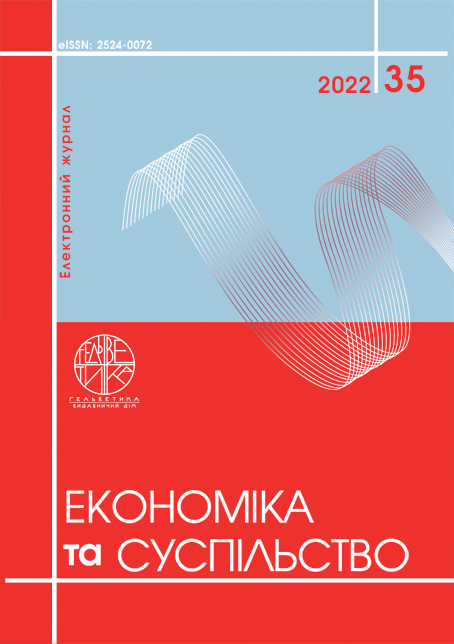DESIGN OF THE QUALITY MANAGEMENT SYSTEM OF RESTAURANT SERVICE PERSONNEL: ASPECT OF STANDARDIZATION
Abstract
Structural changes in the global and domestic economy strengthen the importance of those industries that have a social direction. It is the constant development of restaurant enterprises and the quality of their services that indicate an increase in a decent standard of living in the country. Today, restaurant enterprises are increasingly paying attention to tracking and analyzing the quality of services of service personnel. Today, for the effective work and development of restaurant enterprises, it is not enough to have perfect business processes. Given the ever-accelerating pace of technological and social change, the ability of companies to quickly adapt to new situations and make effective decisions dynamically is extremely important. In fact, the survival of the restaurant industry in the post-industrial era depends more on the characteristics of the management system than the efficiency of the production system, although the latter situation is also important. The top management of any enterprise or organization is faced with the task of creating an effective management system focused on achieving strategic goals. Each organization determines which improvement tools are best for it. In fact, each industry has its own specifics, and there are standards and rules based on the requirements of DSTU ISO 9001 standards. Only on condition that in addition to the certification process, other measures will be taken, especially related to the achievement of real quality improvements, which will ultimately allow the restaurant industry to avoid ordinary customer complaints and fines for non-fulfillment of contracts in this sector. In addition, managers of restaurant enterprises should be aware that improving management is a long process, so after the introduction of ISO 9001, it is necessary to continue to invest resources for the gradual implementation of the basic principles of the standard (i.e. continuous improvement, general involvement of the company, customer orientation, etc.) in order to ensure compliance with ISO 9001 standards for a higher level of positive impact. Designing a quality system for service personnel in the context of certain segments will allow you to focus the attention of responsible specialists on the main goals of implementing a quality management system for employees. At the same time, the current quality management system of service personnel must be objective and meet the requirements of the international quality standard ISO 9001.
References
Гринько Т.В., Гвініашвілі Т.З. Методичний підхід до управління змінами в діяльності суб'єктів підприємництва. Економіка розвитку. 2017. № 3(83). С. 59–66.
Білецький Е.В., Янушкевич Д.А., Шайхлісламов З.Р. Управління якістю продукції та послуг. Харків. торгов.-економ. інститут КНТЕУ. Харків : ХТЕІ, 2015. 222 с.
Шацька З.Я., Семко В.В. Впровадження нових технологій на вітчизняних підприємствах. Міжнародна науково-практична конференція Сучасні детермінанти розвитку бізнес-процесів в Україні : 2017 р. : матеріали Міжнар. нак.-практ. конф., 24 травня 2017 р. Київ : КНУТД, 2017. С. 370–373.
Гакова М.В. Управління підприємствами готельно-ресторанного господарства: сутність та специфіка. Науковий вісник Ужгородського національного університету. Міжнародні економічні відносини та світове господарство. 2017. № 13. Ч. 1. С 55–60.
Рябенька М.О. Оцінка якості послуг у готелях і ресторанах. Причорноморські економічні студії. 2020. Вип. 52. Ч. 2. C. 46–51. URL: https://tourlib.net/statti_ukr/ryabenka2.htm
Колективні засоби розміщування (2011-2019). Державна служба статистики України : веб-сайт. URL: http://www.ukrstat.gov.ua
Fonseca L. M. Relationship between ISO 9001 certification maturity and EFQM Business Excellence Model results. Quality, Innovation and Prosperity. 2015. № 19 (1). Р. 85–102.
Hrynko, T.V. and Hviniashvili, T.Z. (2017), “Methodical approach to change management in the activities of business entities”, Ekonomika rozvytku, vol. 3(83), pp. 59–66.
Bilets'kyj, E.V. Yanushkevych, D.A. and Shajkhlislamov, Z.R. (2015), Upravlinnia iakistiu produktsii ta posluh [Product and service quality management], Kharkiv Torhov.-ekonom. Instytut KNTEU, Kharkiv, Ukraine.
Shats'ka, Z.Ya. and Semko, V.V. (2017), “Introduction of new technologies at domestic enterprises”, Mizhnarodna naukovo-praktychna konferentsiia Suchasni determinanty rozvytku biznes-protsesiv v Ukraini [International scientific-practical conference Modern determinants of business process development in Ukraine], Kyivskyj natsionalnyj universytet tekhnolohij ta dyzajnu, Ukraine.
Hakova, M.V. (2017), “Management of hotel and restaurant enterprises: essence and specifics”, Naukovyj visnyk Uzhhorods'koho natsional'noho universytetu. Mizhnarodni ekonomichni vidnosyny ta svitove hospodarstvo, vol. 13, рр. 55–60.
Riaben'ka, M.O. (2020), “Evaluation of the quality of services in hotels and restaurants”, Prychornomors'ki ekonomichni studii, vol. 52, no. 2, рр. 46–51, available at: https://tourlib.net/statti_ukr/ryabenka2.htm
State Statistics Service of Ukraine (2020), “Collective accommodation facilities (2011-2019)”, available at: http://www.ukrstat.gov.ua
Fonseca L.M. (2015. “Relationship between ISO 9001 certifica-tion maturity and EFQM Business Excellence Model results”. Quality, Innovation and Prosperity, № 19 (1). Р. 85–102.


